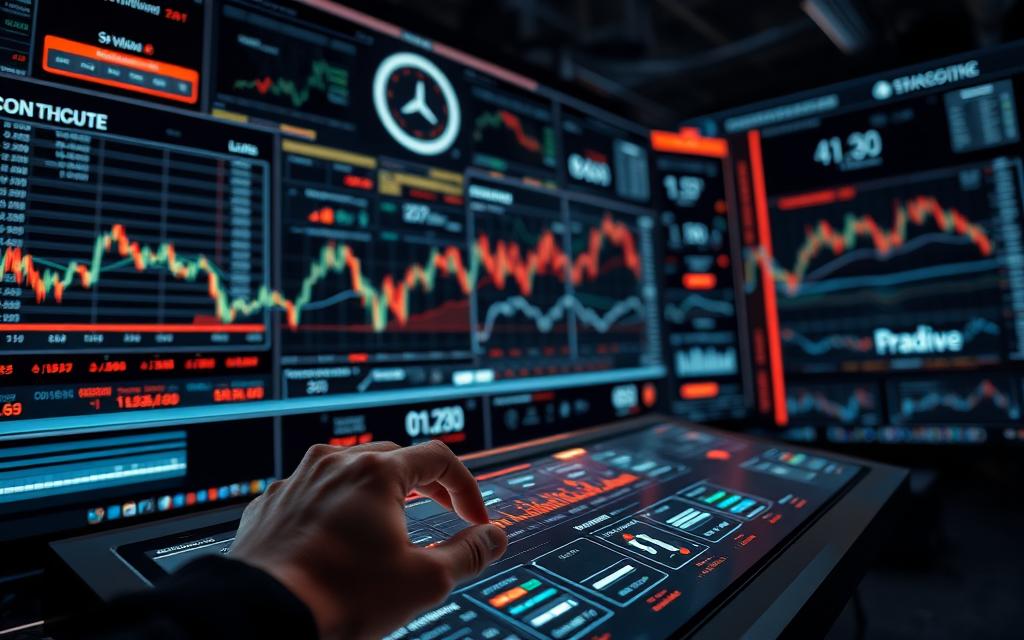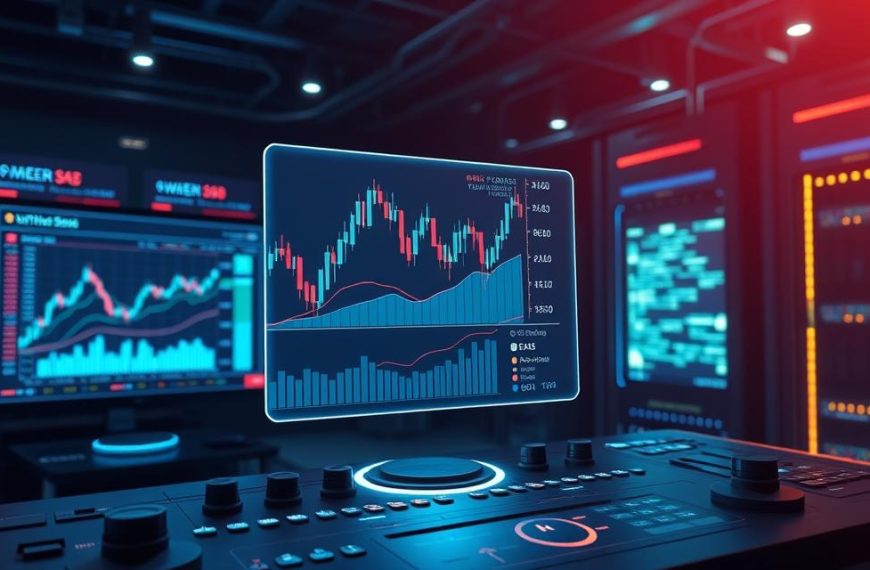Modern digital markets demand precision and adaptability. Automated tools now play a pivotal role in navigating volatile conditions, enabling participants to execute strategies without constant oversight. This guide focuses on solutions that combine artificial intelligence with market expertise to streamline decision-making processes.
Advanced algorithms analyse real-time data to identify patterns humans might miss. These systems operate continuously, seizing opportunities across time zones and market cycles. By removing emotional biases, they help maintain discipline even during price fluctuations.
Our analysis compares leading platforms tested by financial technology specialists. Evaluation criteria prioritise security protocols, customisation options, and historical performance metrics. We’ve assessed how each system adapts to different risk profiles and investment horizons.
Regulatory compliance remains crucial in this evolving space. Our recommendations consider transparency in fee structures and adherence to financial regulations. Whilst automation offers advantages, understanding a tool’s limitations proves equally important for long-term success.
This review equips both newcomers and seasoned participants with insights to choose suitable technologies. Subsequent sections break down platform-specific features, from backtesting capabilities to integration with major exchanges. Discover how modern innovations are reshaping participation in digital asset markets.
Understanding Crypto Trading AI Bots
Sophisticated software solutions have transformed how market participants engage with volatile asset classes. These programmes combine rule-based logic with adaptive learning to navigate complex price movements efficiently.
Core Functionality Explained
Modern systems operate through three primary components:
- Exchange connectivity via secure APIs
- Real-time data analysis engines
- Decision-making algorithms
These elements work synchronously to scan multiple exchanges, identify price discrepancies, and execute predefined actions. Unlike manual approaches, they process historical trends and live feeds simultaneously.
Intelligent Adaptation Mechanisms
Machine learning models enable continuous strategy refinement. Through neural networks, systems:
- Adjust parameters based on success rates
- Incorporate sentiment analysis from news sources
- Modify risk thresholds during volatility spikes
Key differentiators include predictive capabilities that anticipate market shifts hours before traditional indicators. This proactive stance helps capitalise on emerging opportunities whilst minimising exposure.
Proper configuration remains vital – even advanced tools require initial strategy input and periodic adjustments. Users should monitor performance metrics to ensure alignment with personal financial objectives.
How AI Enhances Modern Trading Strategies
Innovative technologies now empower market participants to refine their approaches with surgical accuracy. By merging computational power with predictive analytics, these tools transform reactive methods into proactive systems capable of navigating complex scenarios.
Algorithmic Precision and Automated Execution
Mathematical models eradicate emotional decision-making by following predefined rules without deviation. Systems analyse historical patterns and live data streams simultaneously, executing orders at optimal moments. This approach proves particularly effective for techniques requiring split-second timing.
High-frequency operations and statistical arbitrage demonstrate this advantage. Algorithms process thousands of transactions per second, capitalising on micro price movements invisible to human observers. Such capabilities enable strategies that would otherwise remain theoretical.
Round-the-Clock Trading Advantages
Digital markets operate continuously, creating opportunities during unconventional hours. Automated solutions monitor global exchanges whilst users attend to personal commitments, ensuring no potential advantage goes unnoticed.
Three critical benefits emerge:
- Immediate reaction to sudden price shifts
- Exploitation of time-zone arbitrage possibilities
- Consistent application of risk protocols
These systems adapt positions based on volatility indicators and portfolio balance. Dynamic stop-loss mechanisms and position sizing calculations occur in real-time, protecting investments during unexpected market movements. The result? A disciplined approach that maintains strategic focus regardless of external factors.
Evaluating Risk Management and Security Features
Robust security protocols form the backbone of reliable automated trading systems. Leading platforms prioritise layered defences against cyber threats whilst implementing mechanisms to minimise financial exposure during turbulent market phases.
Ensuring Data Protection and Secure Practices
Top-tier services employ military-grade encryption for both data transmission and storage. Secure API connections prevent unauthorised access, with strict permissions ensuring platforms can’t withdraw funds from linked exchange accounts. 3Commas exemplifies this approach, using read-only API keys that allow strategy execution without compromising asset control.
Multi-factor authentication adds another verification layer, particularly crucial for accounts holding significant balances. Regular third-party audits and compliance with GDPR standards demonstrate a platform’s commitment to transparency. Users should verify certification details and incident response protocols before committing funds.
Tools for Automatic Risk Mitigation
Sophisticated systems deploy multiple safeguards against sudden market shifts. Automated stop-loss orders and position-sizing algorithms adjust exposure based on real-time volatility metrics. Consider these essential features:
| Feature | Function | Benefit |
|---|---|---|
| Volatility Filters | Pause trading during extreme price swings | Prevents ill-timed entries/exits |
| Correlation Analysis | Monitor asset relationships | Reduces portfolio overlap risks |
| Redundancy Systems | Backup servers during outages | Maintains strategy continuity |
Advanced platforms incorporate drawdown limits that automatically reduce position sizes after consecutive losses. Real-time performance dashboards help users monitor these safeguards, whilst historical data reviews enable continuous strategy refinement. Proper configuration ensures these tools complement rather than constrain trading objectives.
Features to Look for in a Best crypto trading ai bot
Selecting effective automated solutions requires prioritising adaptability and precision. Platforms must balance sophisticated analysis with user-friendly interfaces to accommodate diverse investment approaches. Let’s explore critical components that separate premium services from basic offerings.
Customisable Trading Strategies and Indicators
Top-tier platforms provide extensive libraries of technical tools. Moving averages, RSI, and Bollinger Bands form the foundation for crafting personalised approaches. Advanced systems integrate custom formulae, letting users create hybrid indicators for niche market conditions.
Backtesting modules prove essential for strategy validation. Historical simulations reveal how approaches would perform during bull markets or corrections. Three vital customisation features:
| Feature | Purpose | Advantage |
|---|---|---|
| Technical Indicators | Identify entry/exit signals | Enhances timing accuracy |
| Backtesting Modules | Test historical performance | Reduces deployment risks |
| Multi-Exchange Support | Access global liquidity | Improves execution prices |
Real-Time Market Data and Execution Capabilities
Leading systems process order book depth and volume metrics within milliseconds. This speed enables capitalising on fleeting arbitrage opportunities across exchanges. Latency below 50ms ensures strategies aren’t undermined by delayed executions.
Integrated sentiment analysis tools scan news sources and social media. They adjust risk parameters during major events like regulatory announcements. Such features help maintain profitability amidst sudden market shifts.
Effective platforms combine these elements with intuitive dashboards. Users monitor performance metrics whilst retaining full control over automated processes. The result? A balanced approach merging technological power with human oversight.
In-Depth Review: ArbitrageScanner
Market participants seeking cross-exchange opportunities require robust analytical capabilities. ArbitrageScanner delivers this through its expansive coverage of 40+ centralised and decentralised platforms, identifying price gaps faster than manual methods allow.
Key Features and On-Chain Analysis
The platform’s API-free design eliminates security risks associated with traditional exchange connections. Its on-chain analytics engine tracks wallet movements and transaction patterns, revealing strategies employed by successful participants. Users access:
- Real-time arbitrage signals every two seconds
- DEX/CEX spread comparisons
- Perpetual futures-spot discrepancies
Documented cases show monthly returns between 15-50%, with one individual securing £360 profit through simple cross-platform transactions. Advanced options include white-label solutions for enterprises and custom API integrations.
User Experiences and Community Insights
A private forum connects members with experienced arbitrage specialists. New participants benefit from video tutorials replicating profitable scenarios. “The training modules transformed how I approach spread trading,” notes a UK-based user.
Community-shared strategies help navigate volatile conditions while maintaining risk controls. The platform’s educational resources demystify complex concepts, making sophisticated techniques accessible to various skill levels.
In-Depth Review: Cryptohopper
Navigating automated investment tools requires platforms that cater to diverse experience levels. Cryptohopper strikes this balance through its dual focus on sophisticated functionality and approachable design, making advanced techniques accessible across skill tiers.
Automation, Social Trading and Free Bot Creation
The platform’s standout feature lies in its customisable bot marketplace. Users develop strategies using 16 technical indicators or replicate proven approaches from experienced community members. Social trading integration allows real-time strategy sharing, creating collaborative opportunities rarely seen in competitive environments.
Free bot creation removes financial barriers to experimentation. Traders test hypotheses across 75 digital assets without upfront costs, supported by Binance and Coinbase Pro integrations. Backtesting modules validate approaches against historical crashes and bull runs – essential for refining risk management protocols.
Ease of Use for Beginners and Pros
Clear dashboard layouts simplify complex processes like portfolio rebalancing. Dropdown menus guide newcomers through strategy configuration, while API access accommodates algorithmic developers. The 24/7 operation ensures no market movement goes unexploited, regardless of time zones.
“What sets Cryptohopper apart is its educational ecosystem,” notes a London-based user. Video tutorials and responsive support staff help demystify automated systems. Combined with a free trial period, this creates low-risk entry points for those exploring digital asset management tools.
FAQ
How do automated platforms handle volatile market conditions?
These systems employ algorithms that analyse real-time data, adjusting strategies dynamically. They use indicators like moving averages or RSI to identify trends, executing trades based on predefined rules without emotional bias.
What security measures protect user funds and data?
Leading platforms integrate encryption protocols, two-factor authentication and cold storage for digital assets. Regular audits and compliance with financial regulations further ensure secure practices against cyber threats.
Can beginners create custom strategies without coding knowledge?
Yes. Many services offer drag-and-drop builders or preconfigured templates. Tools like Cryptohopper allow users to implement social trading, replicating strategies from experienced investors effortlessly.
How does backtesting improve portfolio management?
Backtesting evaluates strategies against historical data, identifying strengths and weaknesses. This helps refine approaches before live deployment, optimising risk-reward ratios across diverse markets.
Do these tools support futures or derivatives trading?
Certain advanced platforms, including ArbitrageScanner, provide access to futures markets. Users should verify exchange compatibility and leverage settings to align with their risk tolerance.
What distinguishes on-chain analysis in automated systems?
Platforms like ArbitrageScanner monitor blockchain transactions in real time, detecting large wallet movements or liquidity shifts. This data informs arbitrage opportunities across exchanges faster than manual methods.
Are free trials available for testing features risk-free?
Many providers offer limited-time demo modes or tiered subscriptions. Always review pricing structures to understand execution speeds and premium feature availability during trial periods.















